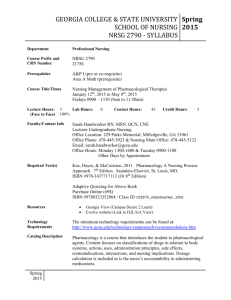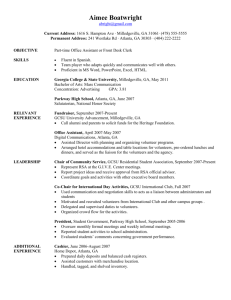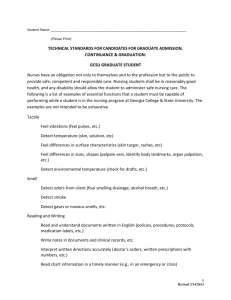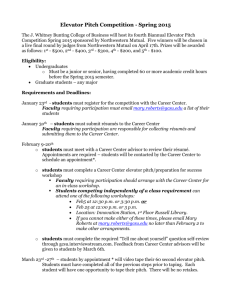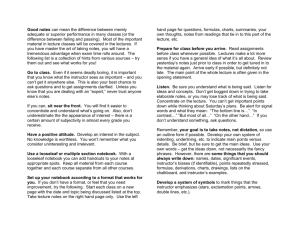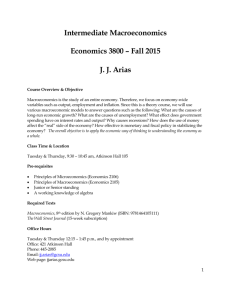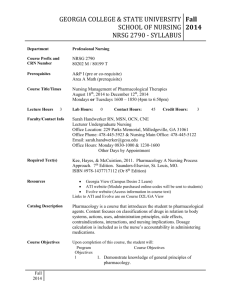NRSG 3140 - Georgia College & State University
advertisement
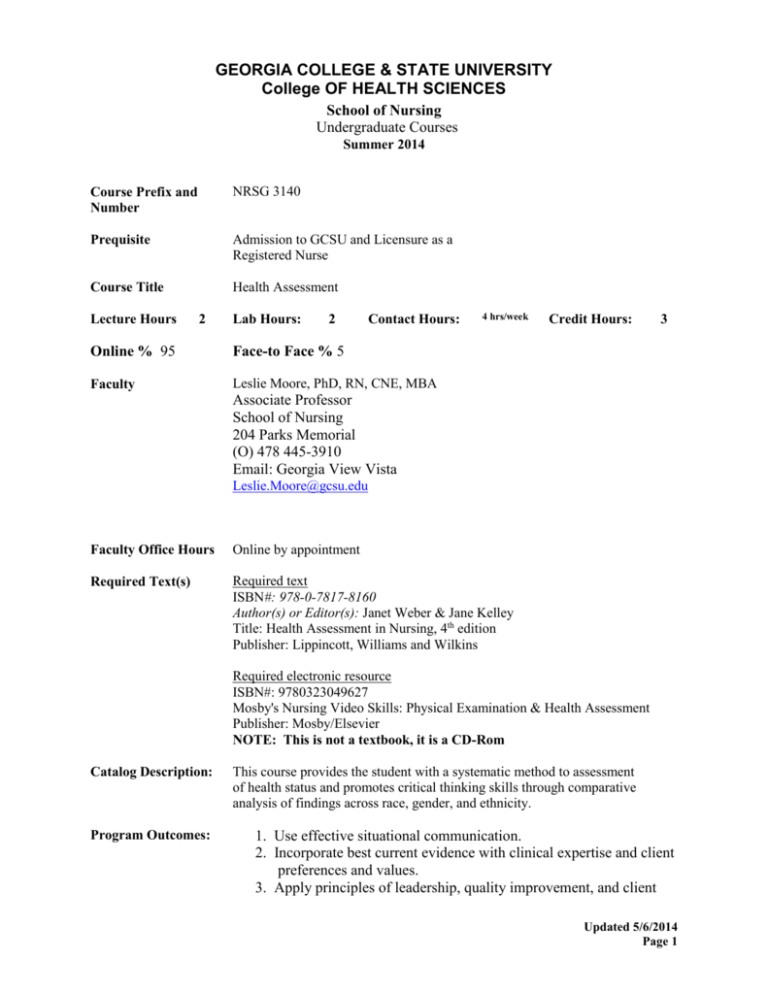
GEORGIA COLLEGE & STATE UNIVERSITY College OF HEALTH SCIENCES School of Nursing Undergraduate Courses Summer 2014 Course Prefix and Number NRSG 3140 Prequisite Admission to GCSU and Licensure as a Registered Nurse Course Title Health Assessment Lecture Hours 2 Lab Hours: 2 Contact Hours: Online % 95 Face-to Face % 5 Faculty Leslie Moore, PhD, RN, CNE, MBA 4 hrs/week Credit Hours: 3 Associate Professor School of Nursing 204 Parks Memorial (O) 478 445-3910 Email: Georgia View Vista Leslie.Moore@gcsu.edu Faculty Office Hours Online by appointment Required Text(s) Required text ISBN#: 978-0-7817-8160 Author(s) or Editor(s): Janet Weber & Jane Kelley Title: Health Assessment in Nursing, 4th edition Publisher: Lippincott, Williams and Wilkins Required electronic resource ISBN#: 9780323049627 Mosby's Nursing Video Skills: Physical Examination & Health Assessment Publisher: Mosby/Elsevier NOTE: This is not a textbook, it is a CD-Rom Catalog Description: Program Outcomes: This course provides the student with a systematic method to assessment of health status and promotes critical thinking skills through comparative analysis of findings across race, gender, and ethnicity. 1. Use effective situational communication. 2. Incorporate best current evidence with clinical expertise and client preferences and values. 3. Apply principles of leadership, quality improvement, and client Updated 5/6/2014 Page 1 safety to monitor and improve outcomes of nursing care. 4. Demonstrate professional nursing values of altruism, autonomy, human dignity, integrity, and social justice. 5. Provide culturally and spiritually sensitive care. 6. Apply principles of health promotion, disease and injury prevention to maximize health outcomes. 7. Recognize the need for advocacy in regulatory, legislative, and public policy that influences the health care system. 8. Collaborate with the client and health care team in providing compassionate and coordinated care. 9. Demonstrate competent use of informatics to support decision making, mitigate error, and improve outcomes. 10. Synthesize concepts from liberal arts and sciences, clinical reasoning, and nursing to form the basis for professional practice. Course Outcomes Upon completion of this course, the student will: Program Objectives 1 Course Objectives 1. Use effective situational communication for the 4 2. 5, 10 3. 6 4. 5. 6. Topic Outline purpose of conducting a holistic health assessment. Demonstrate professional nursing values of altruism, autonomy, human dignity, and integrity when conducting a health assessment. Employ a systematic process to conduct a health assessment that is culturally and spiritually sensitive. Analyze assessment data to form appropriate nursing diagnoses for individual clients. Apply concepts from liberal arts, social, and natural sciences, clinical reasoning, and nursing science t differentiate normal from abnormal physical examination findings. Use critical thinking to relate subjective data from health history to objective findings in physical assessment. Unit 1. Interviewing and the Health History Unit 2. Physical Assessment Techniques and Nutrition Unit 3. Examination of the Integument Unit 4. Examination of the Head and Neck Unit 5. Examination of the Thorax and Lungs Unit 6. Examination of the Heart and Peripheral Vasculature Unit 7. Examination of Abdomen Unit 8. Examination of Musculoskeletal System Unit 9. Examination of Neurological System Unit 10. Examination of the Breast and Lymph Nodes Unit 11. Examination of Genitalia and Rectum Unit 12. The Complete Health History and Physical Examination Updated 5/6/2014 Page 2 Teaching/Learning Methods This is a web-based course. Students will be expected to interact with the instructor as needed through the course web site and by appointment online. Evaluation Methods Evaluation Method % Relationship to Course Learning Outcomes HESI Exam 35% Course Outcomes 1-6 Physical Exam check-off 35% Course Outcomes 3-6 Pre-Lab Quizzes 20% Course Outcomes 1-6 Clinical Discussion Postings 10% Course Outcomes 1-6 Grading Scale A = 91-100 B = 83-90 C = 75-82 D = 66-74 F = < 65 Course Policies All policies in the current Georgia College & State University Undergraduate Catalog and the Undergraduate Nursing Student Handbook are applicable. Please consult web site for handbook at the following sites: http://www.gcsu.edu/registrar/catalog.htm and http://info.gcsu.edu/intranet/health_sciences/bsn handbook/bsnhndbk.doc. In addition to these University and School policies, students are expected to comply with the following course policies: All students must regularly check eCats email to receive official communication from university faculty and staff. All students must have an activated Bobcat identification card. The Bobcat card is required to use all library services, including the computer lab for testing. Rounding Policy: Rounding for this course will occur only with the final average grade for the course. There will be no rounding of exam grades or other written assignments during the semester. If the final course average to the nearest tenth is .5 or more, the final course grade will be rounded up to the next whole number (i.e. 88.5 would be rounded to 89) (i.e. 88. 45 would not be rounded). EXAMS: Exams for this course will be administered electronically in a computer laboratory setting to simulate the NCLEX environment. No personal belongings, books, or notes can be taken into the computer lab. All hats will be removed for the testing period. Updated 5/6/2014 Page 3 There will be no scheduled make-up exam dates for this course. ATTENDANCE & PUNCTUALITY: Instructors will verify attendance at the first class for the Registrar’s purposes. Students should refer to the attendance policy in the GCSU Nursing Program undergraduate handbook. PHYSICAL ASSESSMENT CHECK-OFF: Students will record their performance of a head-to-toe physical assessment at the end of the course (see calendar for dates). Students must score an 85 or better to pass the check off. Students will be allowed one time to repeat their physical assessment check off. The recorded grade will be the average of the two check-offs (if a second check off is required). NO FOOD OR DRINK WILL BE PERMITTED IN CLASSROOMS OR THE CLINICAL LABORATORY PER COLLEGE OF HEALTH SCIENCES POLICY. Technology Requirements The minimum technology requirements: http://www.gcsu.edu/technology/campustech/recommendations.htm Microsoft on-line training resource: http://office.microsoft.com/enus/support/training-FX101782702.aspx?redir=0 Academic Honesty The integrity of students and their written/oral work is a critical component of the academic process. All written work submitted in this course will be individual work unless otherwise instructed. The submission of another’s work as one’s own is plagiarism and will be dealt with using the procedures outlined on pp. 64-67 in the Undergraduate Catalog. Remember that allowing another student to copy one’s own work is considered cheating. Also see the student Honor Code at the website below: http://www.gcsu.edu/studentlife/handbook/code.htm Religious Observance Students are permitted to miss class in observance of religious holidays and other activities observed by a religious group of which the student is a member without academic penalty. Exercising of one’s rights under this policy is subject to the GC Honor Code. Students who miss class in observance of a religious holiday or event are required to make up the coursework missed as a result from the absence. The nature of the makeup assignments and the deadline for completion of such assignments are at the sole discretion of the instructor. Failure to follow the prescribed procedures voids all student rights under this policy. The full policy and prescribed procedures are found at: http://senate.gcsu.edu/prod/motions/support_docs/499/1295533007_Reli gous%20Observance%20Policy%20for%20senate.docx Updated 5/6/2014 Page 4 Fire Drill Procedure Fire drills will be conducted annually. In the event of a fire alarm, students will exit the building in a quick and orderly manner through the nearest hallway exit. Learn the floor plan and exits of the building. Do not use elevators. If you encounter heavy smoke, crawl on the floor so as to gain fresh air. Assist disabled persons and others if possible without endangering your own life. Assemble for a head count at the designated assembly area for this building. For more information on other emergencies, please visit http://www.gcsu.edu/emergency/actionplanmain.htm Request for Disability Modifications: If you have a disability as described by the Americans with Disabilities Act (ADA) and the Rehabilitation Act of 1973, Section 504, you may be eligible to receive accommodations to assist in programmatic and physical accessibility. Disability Services, a unit of the GCSU Office of Institutional Equity and Diversity, can assist you in formulating a reasonable accommodation plan and in providing support in developing appropriate accommodations to ensure equal access to all GCSU programs and facilities. Course requirements will not be waived, but accommodations may assist you in meeting the requirements. For documentation requirements and for additional information, we recommend that you contact Disability Services located in Maxwell Student Union at 478-445-5931 or 478-445-4233. Any student requiring instructional modifications due to a documented disability should make an appointment to meet with Dr. Moore within in the first week of classes. An official letter from GCSU documenting the disability is expected in order to receive accommodations. Interlibrary Loan Students are encouraged to use the GCSU Library and the interlibrary loan services (http://www2.gcsu.edu/library/ill/) to obtain journal articles relevant to this course. Updated 5/6/2014 Page 5
